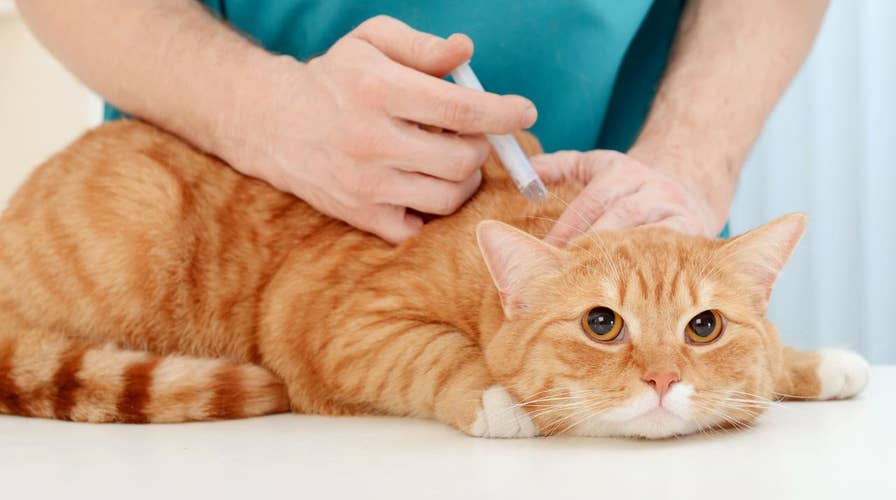Lawsuit: Cats and kittens killed in USDA experiments
A look at a lawsuit against the USDA claiming it killed kittens and cats for experimentation.
From the outside, the U.S. Department of Agriculture’s laboratory in Beltsville, Md., is indistinguishable from any of the dozens of other federal facilities that dot the Washington, D.C. suburbs. Its red brick, colonial façade houses government scientists and researchers plugging away at mundane tasks and experiments to ostensibly keep the population safe from foodborne illnesses and other diseases.
But since the early 1980s, and possibly much longer, this USDA lab has been home to a long-running and gruesome series of experiments in which at least 3,000 kittens have been bred, fed parasite-infected raw meat for two to three weeks and then killed with a shot of the powerful anesthetic ketamine to the heart before being incinerated.
After the kitten killings were exposed by watchdog group the White Coat Waste Project earlier this year, a bipartisan group of lawmakers are now pressuring the USDA to stop what Congressman Mike Bishop, R-Mich., calls both an “inhumane practice” and “an example of wasteful spending.”
“I first started out looking into wasteful government spending,” Bishop told Fox News. “But when I found out about this, it became even bigger and more important.”
Bishop added: “This goes way beyond animal testing.”
According to documents obtained by White Coat Waste Project, the USDA has been breeding around 100 cats every year and infecting them with a parasite that can cause toxoplasmosis, a disease that can cause miscarriages and birth defects in humans and is a leading cause of death from foodborne illness in the U.S.
After infecting the cats with the parasites, researchers at the USDA collect samples of the feline feces for about two to three weeks before killing them, even though studies indicate that the cats can be treated for the disease and there is only a small chance that humans could contract the illness from handling infected cats.
“Since most healthy cats groom themselves frequently, and it takes a minimum of 24 hours before the oocysts in the feces are infectious, it is unlikely that feces would remain on their fur long enough for any oocysts to become infectious,” a report from the American Veterinary Medical Association noted.
In May, Bishop sent a letter to Secretary of Agriculture Sonny Perdue, calling for an investigation into the program and questioning why the kittens are killed instead of being offered for adoption.
This is inhumane what they are doing. It is blatantly inhumane.
The White Coat Waste Project then filed a lawsuit against the USDA in June amid claims that the department was blocking its Freedom of Information Act (FOIA) request for more information regarding the research, including the veterinary records for around 3,000 cats that have been killed since 1982.
Justin Goodman, the vice president for advocacy and public policy at the White Coat Waste Project, told Fox News he believes the USDA has violated FOIA by failing to produce the requested information and that the department has been able to carry out these tests for so long because there is little oversight on its work.
“Uncle Sam has kept this testing a secret for over 50 years,” Goodman said. “Now that people – Democrats, Republicans, independents – know about this, they want to see it relegated to the litter box of history.”

A screenshot of the USDA lab in Beltsville, Maryland. (Google Maps/Google)
A spokesperson for the USDA told Fox News that it does not comment on pending litigation, but the department said in a statement that it “makes every effort to minimize the number of cats used.” According to a letter sent to Bishop, the USDA has used a total of 2,988 cats in its experiments since July 1982.
“The cats are essential to the success of this critical research,” the statement noted, adding: “USDA does not seek adoptions of these cats because of the risk the cats could pose to their adoptive families. Our goal is to reduce the spread of toxoplasmosis. Adopting laboratory cats could, unfortunately, undermine that goal.”
In May, Bishop and fellow lawmaker, Rep. Jimmy Panetta, D-Calif., introduced the "Kittens in Traumatic Testing Ends Now Act of 2018," or KITTEN Act with the hope of forcing Perdue to end the practice of killing cats. In its Agriculture Appropriations bill for Fiscal Year 2019, the Senate Committee on Appropriations also included language urging the USDA to end its kitten experiments.
“The Senate is now starting to help and we’ll continue to pressure the USDA as well as choke off their funding if this testing continues,” Bishop said. “This is inhumane what they are doing. It is blatantly inhumane.”













































